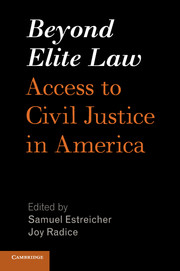Book contents
- Frontmatter
- Contents
- Beyond Elite Law
- Foreword
- List of Contributors
- Overview
- Overview
- PART I CURRENT STATE OF ACCESS TO LEGAL SERVICES
- PART II SOURCES OF LEGAL SERVICES ASSISTANCE FOR WORKING AMERICANS
- PART III FASHIONING A REFORM AGENDA
- 23 New York State Task Force to Expand Access to Civil Legal Services
- 24 New York's 50-hour Pro Bono Requirement
- 25 Starting a “Low Bono” Law Practice
- 26 Toward a More Effective and Accessible Solo and Small Firm Practice Model
- 27 Facilitating Homemade Wills
- 28 Court Facilitation of Self-Representation
- 29 Limited Representation and Ethical Challenges
- 30 Technology Can Solve Much of America's Access to Justice Problem, If We Let It
- 31 Mediation of Employment Disputes at the EEOC
- 32 AAA Consumer Arbitration
- 33 Saturns for Rickshaws: Lessons for Consumer Arbitration and Access to Justice
- 34 Employment Arbitration in the Securities Industry
- 35 FINRA Arbitration and Employment Disputes
- 36 Arbitration as an Employee-Friendly Forum
- 37 Access to Justice in Employment Arbitration: a Critical Look
- 38 Collaborative Technology Improves Access to Justice
- 39 Union Representation in Employment Arbitration
- 40 Legal Representation for New York City's Chinese Immigrant Workers
- 41 Reassessing Unauthorized Practice of Law Rules
- 42 The Pyett Protocol: Collectively-Bargained Grievance Arbitration as a Forum for Individual Statutory Employment Claims
- PART IV CREATING A CULTURE OF SERVICE
- Index
35 - FINRA Arbitration and Employment Disputes
from PART III - FASHIONING A REFORM AGENDA
Published online by Cambridge University Press: 05 May 2016
- Frontmatter
- Contents
- Beyond Elite Law
- Foreword
- List of Contributors
- Overview
- Overview
- PART I CURRENT STATE OF ACCESS TO LEGAL SERVICES
- PART II SOURCES OF LEGAL SERVICES ASSISTANCE FOR WORKING AMERICANS
- PART III FASHIONING A REFORM AGENDA
- 23 New York State Task Force to Expand Access to Civil Legal Services
- 24 New York's 50-hour Pro Bono Requirement
- 25 Starting a “Low Bono” Law Practice
- 26 Toward a More Effective and Accessible Solo and Small Firm Practice Model
- 27 Facilitating Homemade Wills
- 28 Court Facilitation of Self-Representation
- 29 Limited Representation and Ethical Challenges
- 30 Technology Can Solve Much of America's Access to Justice Problem, If We Let It
- 31 Mediation of Employment Disputes at the EEOC
- 32 AAA Consumer Arbitration
- 33 Saturns for Rickshaws: Lessons for Consumer Arbitration and Access to Justice
- 34 Employment Arbitration in the Securities Industry
- 35 FINRA Arbitration and Employment Disputes
- 36 Arbitration as an Employee-Friendly Forum
- 37 Access to Justice in Employment Arbitration: a Critical Look
- 38 Collaborative Technology Improves Access to Justice
- 39 Union Representation in Employment Arbitration
- 40 Legal Representation for New York City's Chinese Immigrant Workers
- 41 Reassessing Unauthorized Practice of Law Rules
- 42 The Pyett Protocol: Collectively-Bargained Grievance Arbitration as a Forum for Individual Statutory Employment Claims
- PART IV CREATING A CULTURE OF SERVICE
- Index
Summary
A major concern for employment arbitration is that well-resourced repeat-player employers have an advantage over employees that they would not have in litigation. Ariel Roth analyzes over 400 arbitration cases, administered under the auspices of the Financial Industry Regulatory Authority (FINRA) during a 22-month period, to test whether employers fare better than employees, as claimants, respondents, repeat players, or facing an unrepresented party. The arbitration data show a higher employer win-rate over employees when the employer brings the claim and when the employer is a repeat player, regardless of whether the employee has an attorney. Unrepresented employees had a fifty-fifty chance of winning just like their represented counterparts. This study did not control for selection effects.
Arbitration is an important part of employment law and resolving employment disputes. Many organizations provide employers and employees the opportunity to settle their disputes through arbitration. In fact, increasingly employment contracts state that a claim must be arbitrated as opposed to litigated. This chapter analyzes claims brought to arbitration through the Financial Industry Regulatory Authority (FINRA), the nongovernmental, self-regulatory organization for brokers and dealers in the U.S. securities industry.
First, an employer needs to become a member of FINRA and in order to become a member they need to qualify for that status under the FINRA By Laws. A member as defined by FINRA “is a brokerage firm that has been admitted to membership in FINRA, whether or not the membership has been terminated or cancelled. A brokerage firm may be a partnership, corporation or other legal entity.” The member status extends to employees of the financial employer. According to the official terminology used by FINRA, employees may also be known as associated members.
This study is a supplement to the preexisting literature focusing on FINRA employment arbitration. It looks at arbitration cases over a 22-month period, from March 2010 to December 2012, and includes over 400 cases. One piece of important information added to the study is an analysis of claims brought pro se. Customer cases were excluded.
TYPES OF CASES
Based on the facts of the case and the claims brought, the cases were placed into seven categories. Those categories were retaliation (RD) claims, bonus and compensation (BC) claims, wrongful termination (WT) claims, discrimination (DS) claims, U-5 form (U-5) claims, general dispute (GD) claims, and promissory note (PN) claims.
- Type
- Chapter
- Information
- Beyond Elite LawAccess to Civil Justice in America, pp. 518 - 522Publisher: Cambridge University PressPrint publication year: 2016
- 2
- Cited by



